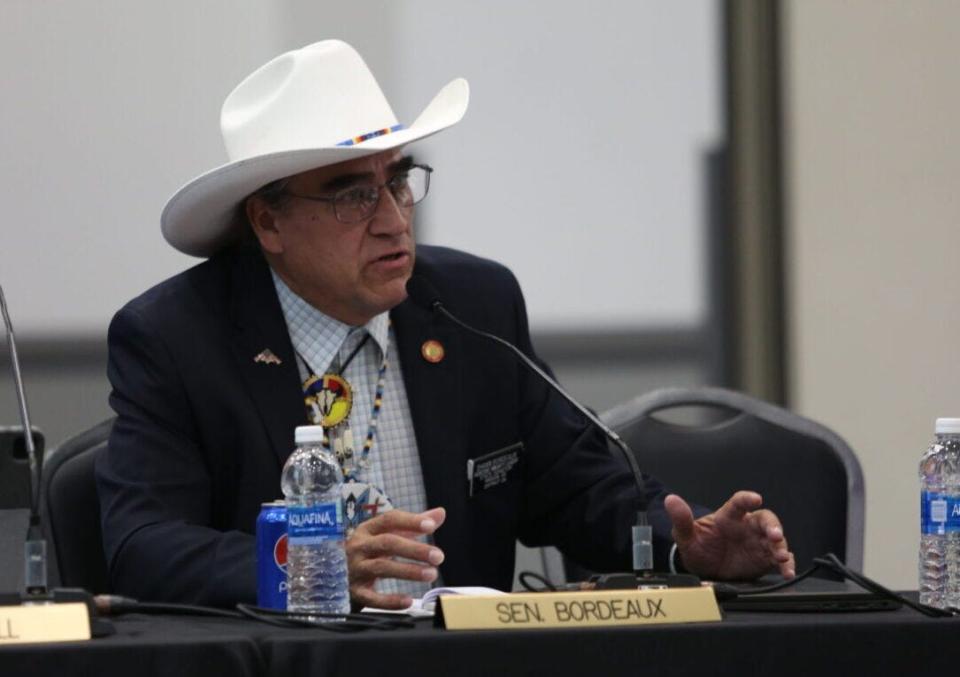Bills prohibiting derogatory Indigenous mascots, playing of Honor Song at graduations fail
- Oops!Something went wrong.Please try again later.
Five members of the Senate Education committee killed four of their colleague’s bills aimed at increasing Indigenous educational opportunities.
Assistant Senate Minority Leader Sen. Shawn Bordeaux (D-Mission)’s bills that were killed in the committee Thursday morning included the following:
Senate Bill 155, to permit the playing of an Honor Song at graduation ceremonies. He brought similar bills in 2019, 2020, 2021, 2022 and 2023.
Senate Bill 157, to establish the nonbeneficiary student scholarship program and make an appropriation therefor. He brought similar bills in 2015, 2016, 2017, 2018, 2019, 2020, 2021, and 2022.
Senate Bill 159, to prohibit school districts from using certain mascots and team names that are derogatory toward Native American peoples or culture. He brought similar bills in 2016, 2020 and 2022
Senate Bill 161, to incorporate the Oceti Sakowin Essential Understandings in the social studies curriculum. He brought similar bills in 2016, 2018, 2020, 2021 and 2023.
Bordeaux, a citizen of the Rosebud Sioux Tribe, wasn’t immediately available for comment after the committee hearing Thursday.

All the bills were killed with the same four or five people voting to move them to the 41st Legislative Day, of which there are only 38: Sen. Tim Reed (R-Brookings), Sen. Kyle Schoenfish (R-Scotland), Sen. Steve Kolbeck (R-Brandon), Sen. Sydney Davis (R-Burbank) and Sen. Tom Pischke (R-Dell Rapids). Bordeaux and Sen. Liz Larson (D-Sioux Falls) had voted to save each one. Davis was excused from the votes on SB 155, SB 157 and SB 159.
With SB 155, Bordeaux said Honor Songs honor people who’ve achieved great things and would show Native graduates their achievements are significant as Native graduation rates lag statewide.
However, SB 155 saw opposition from Doug Wermeda,l with Associated School Boards of South Dakota, who pointed to local control and separate ceremonies as reasons to kill the bill.
SB 157 would’ve defrayed $49,000 in costs for non-Native students to attend Oglala Lakota College, Sinte Gleska University, Sitting Bull College or Sisseton-Wahpeton Community College, but saw opposition from a representative of the Bureau of Finance and Management with concerns about setting a precedent for state money going to private colleges.
Bordeaux had support from Ross Garelick Bell, a lobbyist with the Crow Creek, Lower Brule, Rosebud, Standing Rock and Yankton Sioux Tribes, on SB 159. They both argued that teams like the Sioux Falls Washington High School Warriors should have to change their names and mascots, and that teams or schools misrepresenting Indigenous culture is negative.
More: Lions, tigers and bears: How South Dakota's 149 public school districts chose their mascots
However, SB 159 saw opposition from Wermedal again, who spoke about how teams have changed their names and mascots on their own with community dialogue and local decisions over the years. He said student groups and elders have also had a chance to review the Warrior logo and mascot at WHS.
With SB 161, Bordeaux and Bell spoke about how the OSEUs are important to Native communities, who worked hard to develop the standard, and should be implemented in law and be a required standard, but are optional.
Opposition to SB 161 came from Department of Education Secretary Joe Graves, who said he was reluctant to oppose the bill because he supports the OSEU standards, but that they shouldn’t be embedded solely into social studies standards and actually connect to all standards. Wermedal and Rob Monson with School Administrators of South Dakota also opposed the bill.
This article originally appeared on Sioux Falls Argus Leader: Senate Education committee bars 4 bills from Indigenous legislator

